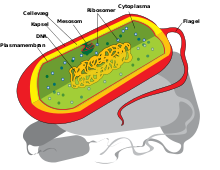Protocyte
Protocyte (also: Procyte ; from ancient Greek πρῶτος prōtos 'first' and κύτος kýtos 'vessel') is the name for the cells of the prokaryotes , d. H. for a cell without a nucleus . The prokaryotes include bacteria and archaea .
In contrast to the cell type of the eukaryotes , the eucyte , the protocytes do not have a real cell nucleus . The DNA is therefore free (but still highly organized) in the cytoplasm (also called stroma here ), so that instead of a cell nucleus one speaks of a nucleus equivalent . Organelles such as mitochondria and plastids are absent.
Instead, plasmids , flagella , pili , vesicles and a cell wall consisting of murein or proteins are common components of the protocyte.
Protocytes can measure from less than 1 micrometer to over 100 micrometers. Most of the time, however, they only reach a size of 1 to 5 micrometers.
So far hypothetical predecessors of the protocytes are the protobionts .
See also
Individual evidence
- ^ Wilhelm Gemoll : Greek-German school and hand dictionary. Munich / Vienna 1965.
